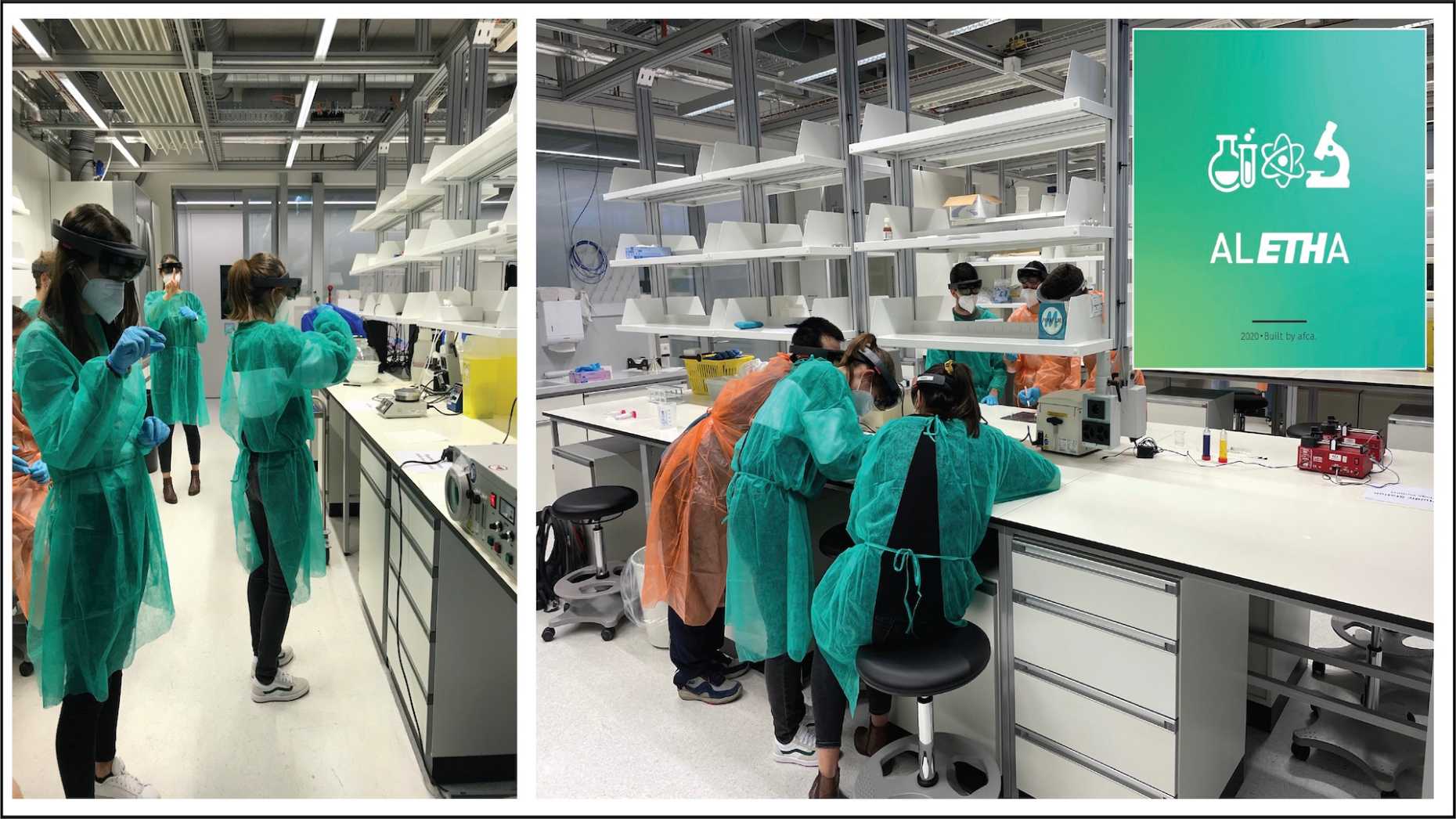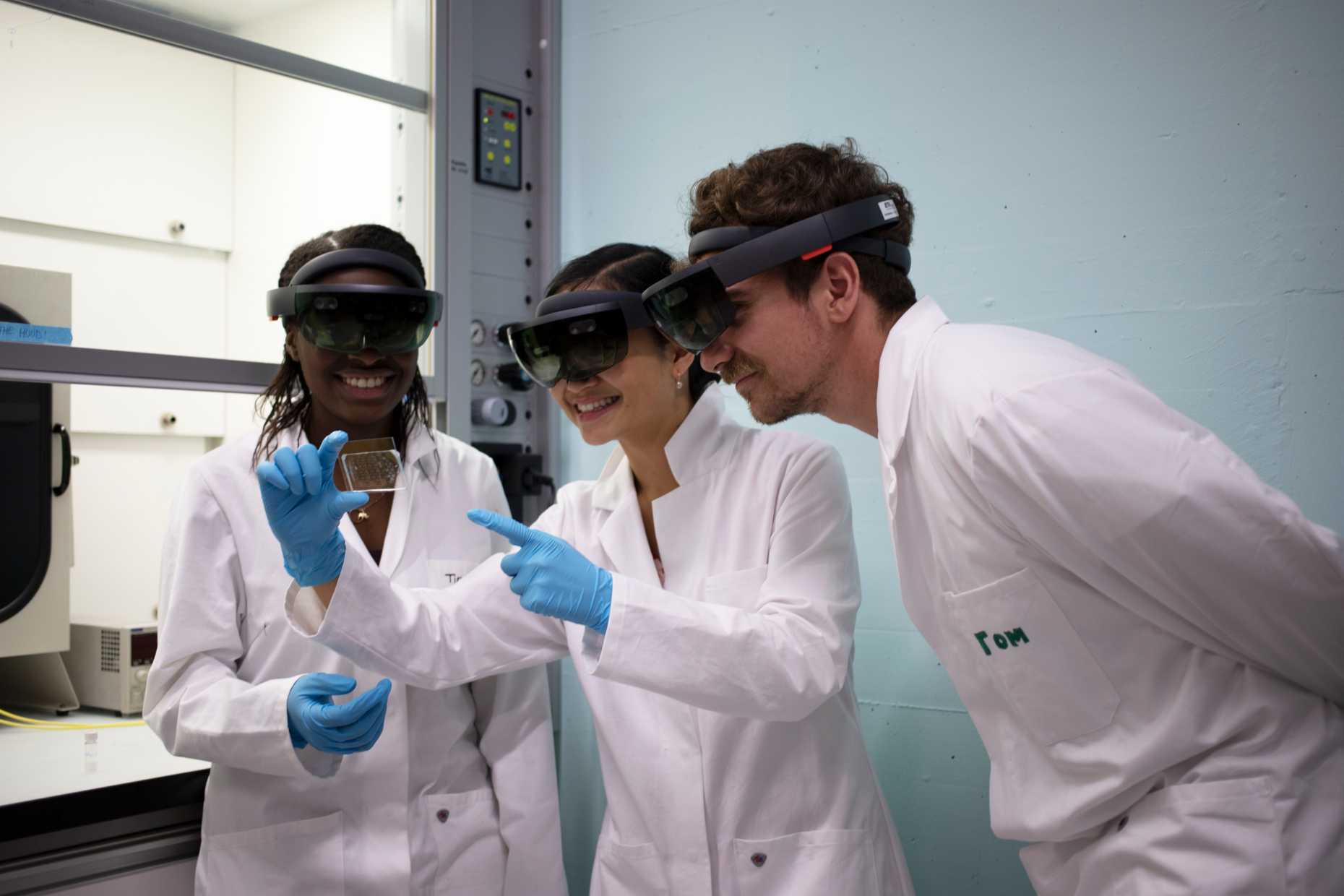"Mixed Reality" in praktischen Laborkursen
Natural Sciences phenomena can be hard to understand due to inherent complexity and the inability to cognitively perceive the underlying processes and mechanisms. This can create a disconnect between a student's understanding of the experiment and the underlying fundamentals. Additionally, it is important to give students the opportunity to change conditions and parameters so they can experience causality and build up intuition. While hands-on activities in laboratory courses help learning by allowing direct interaction with these processes in the real world, these courses often use strict, prescribed protocols that lack opportunities to iterate and control parameters, and ultimately limit the student’s problem solving and critical thinking skills. Moreover, it can be challenging maintaining sufficient physical distance, as it was crucially required during the pandemic.
Individualized electronic learning platforms such as Mixed Reality (MR) combine anchored virtual objects with reality allowing students to experience their environment in new ways, expand beyond strict and limited protocols, and provide them with a safe space to explore the learning material with limited consequences. Additionally, in context of the pandemic, they can offer safe learning environments that can be experienced by students independently.

Implementation of the course during the time of distance learning
We developed a new modular MR application, named ALETHA, grounded in learning science principles, such as control of experimental variables, multimodal representations, gamification, and instructional scaffolding. Our vision is to effectively apply these principles to traditional laboratory courses in a novel way in order to improve student learning in an individualized manner. To begin, we have implemented ALETHA in an interdisciplinary practical course on biofabrication techniques offered to students with diverse backgrounds in life sciences and engineering.
We partnered with the external software company afca and created the application ALETHA for the HoloLens that allows for modular and flexible design of MR lab courses. ALETHA can easily be adapted to other lab courses taught at ETH thanks to its user-friendly web portal. We used ALETHA to design a practical lab course to teach students how to build a microfluidic device. This could be implemented during the pandemic, once teaching of lab courses was allowed again. The HoloLens served as individual teaching assistant for each student, allowing them to learn and work independently, with support, while being physically distanced to each other and lecturers.
In this highly interactive teaching intervention students are immersed in their HoloLense experience. To advance in the program, students need to answer questions that informs them about the next tasks. There is continuous passive support provided though the app, while the teaching form is purely active. If questions are answered correctly, the program advances and a symbol of a collected trophy appears in the app. If the wrong answer is selected, an explanation is provided with further information and hints, and the opportunity to answer again based on this input is given, until the correct answer is chosen.
After a short lecture on the theory and concepts by the lecturer, all following teaching elements are synchronous, i.e instructions and concepts are displayed in the field of view while being actively executed. The students learn to fabricate and evaluate a microfluidic device, but instead of following a strict protocol, they are guided through the process steps along questions that they can answer at their own pace. They can also experiment with physical variables of the microfluidic device settings and test different conditions in simulations that are digitally overlaid onto their real device. The lecturer is on standby and helps in person if needed, students can also communicate with each other and the lecturer or TAs directly, if desired. All communication outside the live course is done via moodle.
A quiz with questions regarding the processes tested and concepts learnt during the use of the app is used for the final assessment. The questions are categorized according to information recall, intuition building and knowledge application. Answers entered in the HoloLens app can be also recorded and could be used to inform lecturers about the individual learning curves.

Course description
Overall concept of the course before the pandemic - during - after
Before the pandemic the students were invited to apply their knowledge on sustainable agriculture, tropical soils and land use to a case study related to a current research project from the Sustainable Agroecosystems group. The seminar was already offering interactions with researchers and extension specialists working in the context of agricultural development. In fall term 2019, the case study was on agroforestry in central Malawi. The case study was closely related to the ongoing research project "Trees for the enhancement of mycorrhizal functioning in lowinput maize cropping systems" by Janina Dierks and science communication materials were developed for the
implementation in a rural context in central Malawi. However, aside from the scientists involved in the project, the students had no interaction with the main audience for their communication material. The main difference brought by the pandemic is to enable a stronger and deeper dialogue between the students and different stakeholders involved in the project. Before the pandemic the outcome of the group work was only brought to the stakeholders of the project at the end of the class.
In the new format (during the pandemic), students were also invited to focus on ways to reach out to a wider public the complexity of science. The seminar was offering continuous interactions with researchers, but also local project managers, schoolteachers, university students, and also artists and other stakeholders of the food system. In the future, various sub-topics like the role of socially engaged art, political ecologies, and decolonial food systems will be explored throughout the lecture. During the pandemic, students were invited to work concretely with the stakeholders to make sure that their work would benefit the dissemination of the RUNRES project in this municipality. From a transdisciplinary perspective, we aimed to engage students in a transdisciplinary lecture as well – co-creating and sharing knowledge with the key stakeholders of the project.